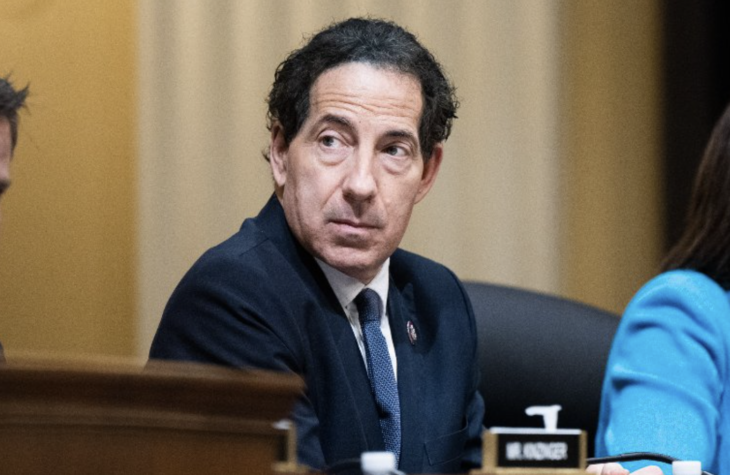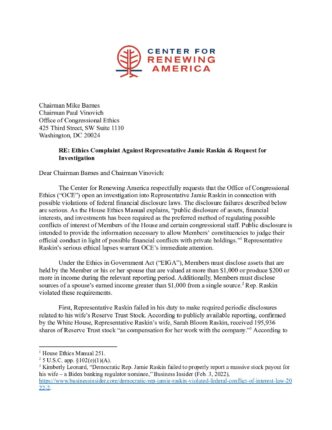
CRA Files Ethics Complaint Against Rep. Jamie Raskin for Violating Federal Financial Disclosure Law
Chairman Mike Barnes
Chairman Paul Vinovich
Office of Congressional Ethics
425 Third Street, SW Suite 1110
Washington, DC 20024
RE: Ethics Complaint Against Representative Jamie Raskin & Request for Investigation
Dear Chairman Barnes and Chairman Vinovich:
The Center for Renewing America respectfully requests that the Office of Congressional Ethics (“OCE”) open an investigation into Representative Jamie Raskin in connection with possible violations of federal financial disclosure laws. The disclosure failures described below are serious. As the House Ethics Manual explains, “public disclosure of assets, financial interests, and investments has been required as the preferred method of regulating possible conflicts of interest of Members of the House and certain congressional staff. Public disclosure is intended to provide the information necessary to allow Members’ constituencies to judge their official conduct in light of possible financial conflicts with private holdings.”1 Representative Raskin’s serious ethical lapses warrant OCE’s immediate attention.
Under the Ethics in Government Act (“EIGA”), Members must disclose assets that are held by the Member or his or her spouse that are valued at more than $1,000 or produce $200 or more in income during the relevant reporting period. Additionally, Members must disclose sources of a spouse’s earned income greater than $1,000 from a single source.2 Rep. Raskin violated these requirements.
First, Representative Raskin failed in his duty to make required periodic disclosures related to his wife’s Reserve Trust Stock. According to publicly available reporting, confirmed by the White House, Representative Raskin’s wife, Sarah Bloom Raskin, received 195,936 shares of Reserve Trust stock “as compensation for her work with the company.”3 According to
1 House Ethics Manual 251.
2 5 U.S.C. app. §102(e)(1)(A).
3 Kimberly Leonard, “Democratic Rep. Jamie Raskin failed to properly report a massive stock payout for his wife – a Biden banking regulator nominee,” Business Insider (Feb. 3, 2022), https://www.businessinsider.com/democratic-rep-jamie-raskin-violated-federal-conflict-of-interest-law-20 22-2.
news reports4, Bloom Raskin received these shares in 2017 when she joined the Board of Directors of Reserve Trust, and she sold these shares in December 2020 for almost $1.5 million. Rep. Raskin, however, failed to disclose these shares in his annual disclosure reports for FY 2017, 2018, or 2019.5 This likely violates Raskin’s EIGA obligation to disclose “personal property held” by him or his wife “as an investment or for the production of income” that have “a value in excess of $1,000 at the close of the reporting period or generated unearned income in excess of $200 during the reporting period.”6 Although the exact value of the shares when Sarah Bloom Raskin received them in 2017 is unknown, it would be surprising if the shares did not reach the reporting threshold no later than 2018 due to Reserve Trust’s obtainment of a special designation from the Federal Reserve while Mrs. Raskin was serving on Reserve Trust’s board. This special designation granted Reserve Trust “unusual access to [the Fed’s] master account — an enviable get that allows the fintech company to move money for customers without relying on bank.”7 This designation very likely would have increased the value of Reserve Trust’s stock above the reporting threshold after it was obtained in 2018. Yet Rep. Raskin failed to disclose these shares in his disclosure reports.
Second, Representative Raskin failed to disclose the source of the Reserve Trust shares on his annual disclosure reports, which is a separate violation of EIGA. As noted above, EIGA requires members to disclose the source and type of income earned by a spouse exceeding $1,000 from a single source.8 These shares, which were compensation for Mrs. Raskin’s services, clearly fit the bill. And given Reserve Trust’s obtainment of the 2018 special designation, these shares would have very likely exceeded any reporting threshold. Yet, Representative Raskin failed to name Reserve Trust as a source of his wife’s earned income on his 2017, 2018, 2019, or 2020 financial disclosures.9 This failure is a clear violation of Raskin’s reporting duties and also
4Id.
5 Rep. Jamie Raskin, 2017 Financial Disclosure Report, filed Aug. 13, 2018, https://disclosures clerk.house.gov/public_disc/financial-pdfs/2017/10024389.pdf; 2018 Financial Disclosure Report, filed May 14, 2019, https://disclosures-clerk.house.gov/public_disc/financial
pdfs/2018/10026939.pdf; 2019 Financial Disclosure Report, filed Aug. 5, 2020, https://disclosures-clerk.house.gov/public_disc/financial-pdfs/2019/10036708.pdf; 2020 Financial Disclosure Report, filed Aug. 13, 2021, available at https://disclosures
clerk.house.gov/public_disc/financial-pdfs/2020/10041117.pdf; see also 5 U.S.C. app. §102. 6 U.S. House of Representatives Committee on Ethics, Instruction Guide: Financial Disclosure Statements and Periodic Transaction Reports, Calendar Year 2020, at 14,
https://ethics.house.gov/sites/ethics.house.gov/files/documents/CY%202020%20Instruction%20Guide%2 0for%20Financial%20Disclosure%20Statements%20and%20PTRs.pdf.
7 Leonard, supra. This special designation was the subject of a separate scandal that led to the withdrawal of Sarah Bloom Raskin from consideration for a position on the Fed. 8 5 U.S.C. app. § 102(e)(1)(A). The Committee’s Instruction Guide provided notice of the breadth of the disclosure requirement for Members: Earned income, reportable on Schedule C, is generally income the filer receives resulting from “the fruit of their labor.” By contrast, income that is unearned, or passive in nature, such as dividends, rent, and partnership income, should be reported on Schedule A, as discussed above. The earned income filers report on Schedule C is intended to be comprehensive and means “all income from whatever source derived, including but not limited to the following items: compensation for services, including fees, commissions, and similar items; gross income derived from business (and net income if the individual elects to include it).”
9 Rep. Jamie Raskin, 2017 Financial Disclosure Report, filed Aug. 13, 2018.
raises serious questions about further potential violations. Since Raskin did not see fit to disclose Reserve Trust as a source of income in 2017, it is unclear if he also failed to do so for subsequent years. It is possible that Reserve Trust compensated Mrs. Raskin with further shares for services
rendered in subsequent years. Given Raskin’s approach to disclosure, the public would never know.
Given Rep. Raskin’s demonstrated lack of transparency, we respectfully request that the OCE ask Rep. Raskin if he engaged in any actions to benefit his wife’s clients, and specifically Reserve Trust, during the time period for which he did not disclose this asset. It is imperative that Members disclose assets that they or their families have in compliance with the law so that the public can assess what may be motivating a Member to take certain positions or actions.
The above demonstrates that Representative Raksin has likely violated his disclosure obligations and creates serious clouds around Raskin’s honesty and ability to represent the best interests of his constituents. Accordingly, the Center for Renewing America respectfully requests that OCE open an investigation into this matter.
Sincerely,
Russ Vought
President, Center for Renewing America




